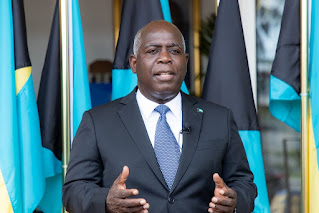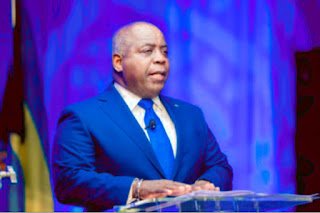Transforming our country’s energy sector has been a priority for us from the start, says Bahamian Prime Minister, The Hon. Philip Brave Davis, KC., MP.,
...
...
On the one hand, we have been compelled by the urgency of change – the need to relieve Bahamian families and businesses from the burden of high prices and unreliable electricity supply.
Relief is an important-enough goal – especially during a global inflation crisis.
But we are also motivated by our profound conviction that our economy can be more competitive, more prosperous, more dynamic, and more inclusive — with more paths to security and success for more Bahamians.
We have very big ambitions for our country and for the Bahamian people.
However – you can’t build a 21st century economy with 20thcentury infrastructure.
In every conversation I have with entrepreneurs, business owners, and investors – from the very smallest to the very largest – the high cost of electricity, and the costs and uncertainties associated with unreliable supply, inevitably come up.
For most Bahamians, the only bill bigger is their rent or mortgage payment. Major bills are a major burden – which means less disposable income, which means less spending and investment in our local economy.
And, of course, high bills for businesses means high operating costs, affecting our competitiveness and our ability to diversify, and creating obstacles to growth and development – impacting investments, business expansions, and job creation.
Now – even with all of those problems, we’re a special-enough country that we’ve come roaring back after the dark days of, Hurricane Dorian, pandemic curfews and lockdowns, breaking big records, with substantial new investments and job growth.
Just imagine what we could accomplish if we had affordable, reliable, clean energy!
That’s where we’re finally headed.
But right before we get to the hopeful part of today’s launch – the solutions! – I want to make sure you all have an understanding of the scale of the challenge.
Important parts of our electricity infrastructure, including some transformers and substations, are more than 50 years old – they date back to before independence!
It’s hard to describe the experience of listening to engineers emphasize that critical parts of our grid are on the verge of collapse – with no chance of revival, once they go down.
And then there are the generation engines – 60% of BPL’s plant in New Providence, and 80% in the Family Islands, need replacement within the next five years.
So we have an aging, vulnerable, deteriorating, expensive system, dependent on heavy and diesel fuels, that cannot meet current needs – let alone the growing energy needs of a digital economy, or the increased demand we have to anticipate as temperatures rise in this new climate era.
If you’re wondering how much it costs to rescue and modernize our grid – I have an answer for you: about half a billion dollars.
Of course, BPL is carrying a legacy debt of the same amount — more than $500 million, not to mention an unfunded pension liability of $100 million.
I could go on – about the grid’s vulnerability to storm damage, the inability of our current system to integrate renewable energy, the tens of millions in rental costs annually which contribute to high prices – but I can see you’re ready to move from problems to solutions.
As were we. We understood that as urgent as change was, the quick short-term fixes that have been the historical pattern have not served our country well.
We knew we needed comprehensive, innovative reform.
Today, we’re excited to share these policies with you, which include:
- A foundational update to transmission and distribution in New Providence, so we can have a more stronger, more resilient, more modern, more efficient power grid – critical to gaining both lower prices and increased reliability;
- For the first time, utility-scale solar power in New Providence – 70 MW of solar power, and 35 MW of Battery Energy Storage Systems will be integrated into the grid;
- Solar power throughout our Family Islands – where new hybrid microgrids will incorporate solar power and natural gas, allowing us to eliminate expensive BPL rentals, replace aging generation units, and establish battery storage systems;
- Natural gas as a partner fuel to solar, to create important savings that can be passed on to the consumer;
- Energy Efficiency Upgrades, including energy audits and efficiency upgrades for government buildings, educational outreach to consumers, LED street lighting, and rooftop solar at schools; and:
- New electricity legislation (Electricity Act 2024), which allows for stronger consumer protections, and – very importantly, as you’ll hear momentarily – allows adjustment to the tariff rates to support consumers who most urgently need relief from high prices.
I’d like to pause here to say that when I asked Minister Coleby-Davis last September to become the country’s Minister of Energy, we discussed our shared priorities for energy reform, which included:
- Immediate relief for Bahamian families
- Reforms that lead to lower prices, and fair prices, over the medium and long term
- Increased reliability
- Increased grid resilience during storms
- Cleaner energy, with a lower carbon footprint…
- An ironclad commitment to union workers, including job and pension security
- New entrepreneurial, employment, and investment opportunities for Bahamians…and:
- Strengthening the financial position of BPL, to ensure legacy debts are addressed.
To the Minister’s credit, she jumped right in and never looked back.
Which is why this morning, she has the honour of sharing more of the details of these big new policies.
And as I turn things over to her, I will close by reminding everyone – we didn’t come here to defend the status quo, we came here to change it.
We are determined to close the gap between our national potential and our national reality – and with this very big and ambitious agenda of reform and investment, we believe we are well on the way to ensuring that a new energy era will lead also to a new economic era – a new era of opportunity for all.




